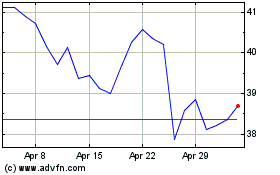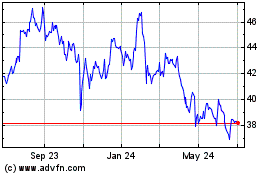Comcast, Charter Push Into Wireless Comes With Limits
September 22 2016 - 5:53PM
Dow Jones News
By Ryan Knutson and Shalini Ramachandran
The two biggest cable companies said this week they will soon
start selling wireless service but they will be entering a
competitive market with handcuffs.
The CEOs at Comcast Corp. and Charter Communications Inc. both
discussed plans to begin reselling Verizon Wireless service as
early as next year. But the Verizon contract only allows the
companies to sell cellphone service as part of a bundle, not as a
stand-alone product, according to people familiar with the
agreement.
That means consumers won't be able to switch to Comcast or
Charter for cellular service without also buying either cable
television or home internet, too.
Comcast CEO Brian Roberts said Tuesday its primary objective in
offering wireless service is to discourage people from switching or
dropping their cable connection. Mr. Roberts said 70% to 80% of
Comcast customers buy a bundle, such as internet and TV, and by
offering cellphones "we can sell them more products."
"We believe there will be a big payback with reduced churn, with
more stickiness, with better satisfaction," he said Tuesday at a
Goldman Sachs investor conference.
Comcast, along with other cable companies, obtained rights to
resell Verizon Wireless service in 2011, as part of a broader $3.6
billion spectrum deal. Charter inherited the agreement earlier this
year after completing a deal to buy Time Warner Cable and Bright
House Networks.
The deal was struck at a time when most cellular plans were
still centered on voice and text messages, not data. So the
wholesale prices the cable companies pay for data might not align
well with today's competitive market.
"I am not worried," Verizon finance chief Fran Shammo said at
the conference Thursday. "If we were to walk in a room today we'd
do the exact same agreement."
Mr. Shammo said that such wholesale agreements are "extremely
profitable" because the company doesn't have to deal with retail
and marketing costs to get the connections.
Still, Charter and Comcast pass tens of millions of households,
and the companies could offer a bundle of internet and cellphone
service that is cheap enough to appeal to the growing number of
cord-cutters. And cable companies could reduce the amount they pay
to Verizon by shifting wireless traffic to the millions of Wi-Fi
hot spots installed around the country.
Cable operators have emphasized that they will deploy even more
secondary Wi-Fi hot spots inside customers' homes and business to
bolster a potential mobile service. They have also noted that they
are far more interested in hawking wireless as an attractive add-on
to their existing bundle of services than as a stand-alone
product.
Offering wireless service could also help cable companies fend
off future competition. AT&T Inc. is preparing to launch a
streaming version of its DirecTV service and has started bundling
its wireless plans with traditional DirecTV.
Wireless carriers are also working on next-generation network
technology, known as 5G, that could be fast enough to allow
customers to buy all their high speed internet -- including inside
the home -- from a cellphone carrier.
"5G fixed wireless would be a competitor to cable or any
broadband connection," Mr. Shammo said. Verizon is planning market
trials in 2017.
Write to Ryan Knutson at ryan.knutson@wsj.com and Shalini
Ramachandran at shalini.ramachandran@wsj.com
(END) Dow Jones Newswires
September 22, 2016 17:38 ET (21:38 GMT)
Copyright (c) 2016 Dow Jones & Company, Inc.
Comcast (NASDAQ:CMCSA)
Historical Stock Chart
From Mar 2024 to Apr 2024

Comcast (NASDAQ:CMCSA)
Historical Stock Chart
From Apr 2023 to Apr 2024
